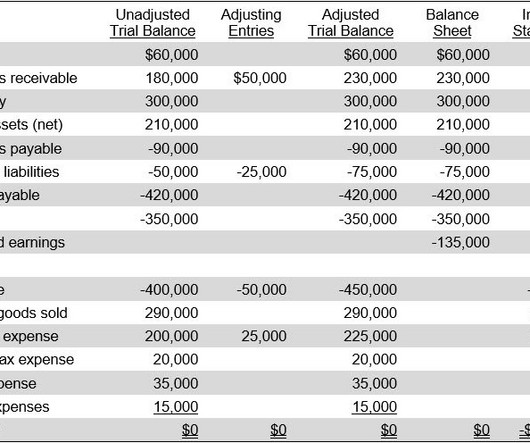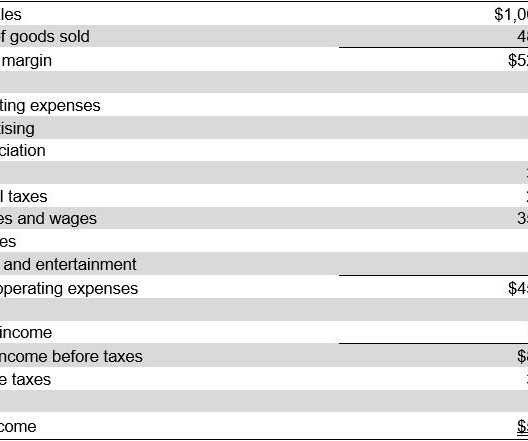Assign Custom Roles to QBO-Accountant Team Members for Clients' Books
Insightful Accountant
JUNE 9, 2024
A new feature rolling out this month allows firms using QBO-Accountant to manage their team member's access to their client's books.

Insightful Accountant
JUNE 9, 2024
A new feature rolling out this month allows firms using QBO-Accountant to manage their team member's access to their client's books.

Accounting Tools
JUNE 9, 2024
What is a Negative Liability? A negative liability typically appears on the balance sheet when a company pays out more than the amount required by a liability. For example, if you were to accidentally pay a supplier's invoice twice, the first payment would reduce the original liability recorded in accounts payable to zero, while the second payment would have no offsetting liability, resulting in a negative liability on the balance sheet.
This site is protected by reCAPTCHA and the Google Privacy Policy and Terms of Service apply.

Insightful Accountant
JUNE 9, 2024
Are you a QuickBooks Online user who loves the flexibility and power of Excel for financial reporting and analysis? If so, then Flash Reports is the game-changer you've been waiting for.

Accounting Tools
JUNE 9, 2024
What is Days Cash on Hand? Days cash on hand is the number of days that an organization can continue to pay its operating expenses , given the amount of cash available. Managers should be aware of the days cash on hand when a business is starting up, and is not yet generating any cash from sales. It is also worth reviewing during the low part of a seasonal sales cycle, when there may be no sales.

Speaker: Dave Sackett
Traditional budgeting and forecasting methods can no longer keep pace with today’s rapidly evolving business environment. Static budgets, rigid annual forecasts, and outdated financial models limit an organization’s ability to adapt to market shifts and economic uncertainty. To stay ahead, finance leaders must leverage a future-forward approach—one that leverages real-time data, predictive analytics, and continuous planning to drive smarter financial decisions.

IMA's Count Me
JUNE 9, 2024
Join Adam Larson in this enlightening episode of the Count Me In Podcast as he chats with Gaby Lahoud , CEO at B Certified Pro and a seasoned certification exam expert with a passion for helping exam takers succeed. Gaby shares invaluable tips on how to go beyond rote memorization and truly understand exam material, which is a game-changer for any certification exam.

Accounting Tools
JUNE 9, 2024
What is an Extended Trial Balance? An extended trial balance is a standard trial balance to which are added columns extending to the right, and in which are listed the following categories: Initial balances per general ledger. These are the account totals as of the end of the accounting period , as compiled from the general ledger. The total of all initial balance debits should equal the total of all initial balance credits.
Financial Ops World brings together the best financial operations content from the widest variety of thought leaders.

Accounting Tools
JUNE 9, 2024
What are General Purpose Financial Statements? General purpose financial statements are those financial statements released to a broad group of users. They are intended for a wide range of uses, such as credit analysis and stock valuations. These statements include the following: Income statement. This report shows the revenues, expenses, and profit or loss of a business over a specific period of time.

Accounting Tools
JUNE 9, 2024
What is the Average Age of Inventory? The average age of inventory is the average period of time required for a business to sell off the inventory it currently has in stock. This measurement is commonly used to determine how well a business manages the amount of stock it has on hand. A short average age of inventory implies that a firm is doing a good job of restricting its investment in working capital.

Accounting Tools
JUNE 9, 2024
There are a number of benefits associated with the issuing additional shares of common stock. These benefits vary for companies that are publicly held and privately held. For both privately and publicly held companies, the following advantages apply: Advantage 1. Debt Reduction The funds a company receives from its sale of common stock does not have to be repaid, and there is no interest expense associated with it.

Accounting Tools
JUNE 9, 2024
What is a Memo Debit? A memo debit is a pending reduction in the cash balance of a bank account , which is a debit transaction. The bank has not yet completely processed the transaction; once it has done so (typically during end-of-day processing), the memo debit designation is replaced by a regular debit transaction, and the cash balance in the bank account is reduced by the amount of the memo debit.

Speaker: Erroll Amacker
As businesses increasingly adopt automation, finance leaders must navigate the delicate balance between technology and human expertise. This webinar explores the critical role of human oversight in accounts payable (AP) automation and how a people-centric approach can drive better financial performance. Join us for an insightful discussion on how integrating human expertise into automated workflows enhances decision-making, reduces fraud risks, strengthens vendor relationships, and accelerates R

Accounting Tools
JUNE 9, 2024
What is an Over Accrual? An over accrual is a situation where the estimate for an accrual journal entry is too high. This estimate may apply to an accrual of revenue or expense. Thus, an over accrual of revenue will result in an excessively high profit in the period in which the journal entry is recorded, while an over accrual of an expense will result in a reduced profit in the period in which the journal entry is recorded.

Accounting Tools
JUNE 9, 2024
What is Payroll? Payroll is the process of providing compensation to employees for their efforts on behalf of a business. It is typically handled by either the accounting department or the human resources department. Many organizations now outsource the bulk of their payroll processing to a third party that specializes in this activity. How to Process Payroll The payroll processing function is highly regimented, and typically involves one of the most-used procedures in the accounting department.

Accounting Tools
JUNE 9, 2024
What is the Return on Working Capital? The return on working capital ratio compares the earnings for a measurement period to the related amount of working capital. This measure gives the user some idea of whether the amount of working capital currently being used is too high, since a minor return implies too large an investment. How to Calculate the Return on Working Capital To calculate the return on working capital, divide earnings before interest and taxes for the measurement period by workin

Accounting Tools
JUNE 9, 2024
What is the Benchmark Hedge Ratio? The benchmark hedge ratio is used to decide upon the targeted proportion of an asset that an organization should hedge in order to reduce the amount of subsequent price fluctuations. The ratio chosen is based on an organization’s appetite for risk, as well as its historical experience with asset price fluctuations in the past.

Advertisement
Based off SkyStem's popular e-Book, the book of secrets to the month-end close will be revealed in this one-hour webinar. Learn leading practices when it comes to building a strong and sustainable month-end close that has room to grow and evolve. Learn about the power of precise estimates, why reconciliations are critical to closing the books, how and when to automate, and how the chart of accounts play into your close process.

Accounting Tools
JUNE 9, 2024
What is Capitalized Interest? Capitalized interest is the interest charge incurred by a business while an asset is being constructed, and which is then added to the cost of the asset. Interest is capitalized in order to obtain a more complete picture of the total acquisition cost associated with an asset , since an entity may incur a significant interest expense during the acquisition and start-up phases of the asset.

Accounting Tools
JUNE 9, 2024
What is an Audit Report? An audit report is a written opinion of an auditor regarding an entity's financial statements. The report is written in a standard format, as mandated by generally accepted auditing standards ( GAAS ). GAAS requires or allows certain variations in the report, depending upon the circumstances of the audit work in which the auditor engages.
Let's personalize your content